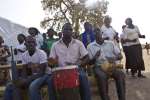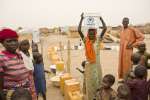High Commissioner' Dialogue on Protection Challenges: Understanding and addressing root causes of displacement - Opening Remarks by António Guterres United Nations High Commissioner for Refugees, Geneva, 16 December 2015
Statements by High Commissioner, 16 December 2015
Excellencies,
Ladies and Gentlemen,
Dear colleagues,
Our world today is at a crossroads. From a humanitarian perspective, this juncture is defined by two "mega-problems": a seemingly uncontrollable multiplication of violent conflicts in an environment of global insecurity, and the pervasive and growing effects of natural hazards and climate change that are already shaping our present and will shape our future even more.
In the last few years, we have seen a staggering escalation of displacement caused both by conflict and by natural hazards. The number of people forced to flee daily as a result of conflict and persecution nearly quadrupled between 2010 and 2014. The last decade has also seen the three hottest years on record, with 2015 expected to be even worse. The resulting steep rise in humanitarian needs far exceeds the capacity of the international humanitarian community to provide the minimum core protection and life-saving assistance to all those affected.
Both of these mega-problems – conflict and climate change – highlight the fundamental importance of political leadership and good governance.
The fact that we are seeing so many new crises breaking out without any of the old ones getting resolved, clearly illustrates the lack of capacity and political will to end conflict, let alone to prevent it. The result is an alarming proliferation of unpredictability and impunity.
On the other hand, after so many years of negotiations, last Saturday's historic agreement on climate change signaled a turning point in the world's way of dealing with one of the most complex problems facing us today. Paris was a victory for global governance, although that only underlines how important it is now to ensure political leadership to turn its commitments into reality.
Conflicts and natural hazards are key among the many factors leading to displacement. But we often tend to oversimplify these concepts to look at humanitarian crises in terms of a dichotomy – conflict versus natural disasters. We treat them as two big streams of displacement. We measure their consequences differently. We design our responses to them differently. While there may be practical arguments for doing this, it also leads to fragmentation and reinforces our tendency to focus on the immediate emergency response without sufficiently analyzing what got us here in the first place.
I see this Dialogue as an opportunity to step back and look at the underlying causes as what they are – multiple, interlinked, overlapping and mutually reinforcing factors that accumulate and contribute to eventually driving people from their homes. Violent conflicts, just like human rights violations and persecution, do not erupt in a vacuum. They are the final result of a complex interaction of problems ranging from inequality and marginalization, lack of good governance and rule of law, competition over shrinking resources in a context of population growth and chaotic urbanization – often exacerbated by environmental degradation and the effects of climate change. The Internal Displacement Monitoring Centre in its excellent background paper for this Dialogue makes a very useful distinction – between the longer-term, less visible drivers of displacement and the immediate trigger events such as the outbreak of fighting, with the latter occurring as a result of the former.
It is clear that we cannot treat these causes in silos, but have to consider them together. A deeper analysis of conflict always requires not only a historical, but also a geographical and an environmental perspective. For example, drought and other environmental hazards can play a significant role in the build-up of conflicts. It is well known that water scarcity often fuels tensions between herder and farmer communities, one of the underlying causes of the conflict that occurred in Darfur. The drought-induced displacement of some 1.5 million Syrians from rural to urban areas between 2007 and 2010 contributed to the factors that eventually led to the break-out of the current conflict. And this phenomenon is by no means new – many historians consider that adverse weather conditions played a significant role in the French Revolution, when peasant revolts followed crop failures and rising food prices.
Leadership and political will are essential to end the violent conflicts that have displaced tens of millions of people and to finally tame the progression of global warming. But meanwhile, development cooperation also has a key role to play in efforts to address the root causes of displacement. Building on the groundwork laid by the 2030 Agenda for Sustainable Development and its commitment to not leaving anyone behind, I see four priorities for development cooperation in the future: adaptation to climate change, a better link with human mobility, durable solutions, and conflict prevention.
First, climate change. Development cooperation policies have to focus to a much stronger degree on climate change adaptation and disaster risk reduction, especially for the most vulnerable segments of populations at risk. Ensuring the resilience of communities and livelihoods will help reduce suffering, prevent displacement and increase the capacity of those affected to cope with recurring natural hazards.
In that context, I was also extremely pleased to see that the Paris Agreement contains specific references to migration and displacement as likely consequences of climate change, and calls on States to take into account in their policies the protection of people who are on the move as a result. The Nansen Initiative, a state consultative process spearheaded by Norway and Switzerland, has done extremely important work in this regard in the past three years. The Protection Agenda it recently adopted at its final consultation meeting in Geneva charts the way forward, and UNHCR stands ready to contribute to this in the future, also building on the commitment in this regard that is enshrined in the Paris Agreement.
Second, there must be a stronger link between development cooperation and human mobility. Development policies should aim at creating the conditions for people to be able to stay and not to be forced to move, to give them a better future in their own countries – essentially, so that migration can be an option rather than a desperate need.
Third, durable solutions for displaced populations must be a clear development priority. With millions of people stuck in displacement for years, if not decades, and "classic" durable solutions available to only a tiny fraction, there has been an increasing drive towards comprehensive solutions strategies that combine a variety of approaches. But predictable, multi-year engagement is essential for these to work, and development actors have a key role to play in this. Initiatives such as the Solutions Alliance can go a long way in promoting support for such solutions strategies, as we will discuss in more detail in one of the thematic sessions later today.
Achieving durable solutions must also include tackling statelessness, which we estimate affects at least 10 million people worldwide and which has contributed to significant internal and external displacement. UNHCR's campaign to end statelessness by 2024 aims to mobilize domestic and international action to prevent new cases and ensure everyone can enjoy the human right of having a nationality. Here, too, development cooperation can make an essential contribution.
And finally, development interventions are crucial for the success of conflict prevention and regional stabilization. The policies and priorities of development cooperation have to take this into account – through a stronger focus on supporting fragile states, on promoting good governance and the rule of law. Functioning justice systems, government effectiveness and national institutions that are able to provide citizens with security and jobs are critical in breaking the cycles of violence and criminality that are often at the root of broader tensions. If they are designed right, development cooperation policies can also support efforts to ensure accountability for human rights abuses and access to justice, and even contribute to measures aimed at countering social exclusion, extremism and sectarian divides.
Linking development cooperation to conflict prevention also means providing more support to those countries that host large numbers of refugees, often at dramatic cost to their own economies and societies. States like Lebanon, Jordan and Turkey, the Islamic Republics of Iran and Pakistan, Kenya and Ethiopia, Cameroon, Chad and Niger, Uganda and the United Republic of Tanzania provide the world with a global public good by taking in millions of refugees from their war-torn neighbours. In doing so, they also contribute to regional stability and many times represent the first line of defense of our collective security.
These States need significantly more international support to cope with the consequences of such massive displacement. But some of them are middle-income countries and hence excluded from several development cooperation instruments. This has to change. States also need to review existing policies so as to enable development actors to work side by side with humanitarians from the beginning of any response to a crisis, helping to stabilize populations, supporting host communities and preventing new cycles of violence.
For our work as humanitarians, it is vitally important to preserve the autonomy of humanitarian space, and the respect for the principles of independence, neutrality and impartiality. But as they plan their development cooperation programmes, States must also recognize that from the point of view of strategic analysis, humanitarian, development and security issues are three faces of the same complex reality, all of which must ultimately converge in the objectives of conflict prevention and conflict resolution.
Ladies and Gentlemen,
The moment has come for a radical change in international efforts to address displacement. As humanitarians, we are supposed to be the first responders – but we are at breaking point. There is no way we can go on treating the symptoms while talking about curing the disease as if that were possible only in an ideal world. We must stop just dealing with the consequences of displacement, and seriously start tackling its root causes.
These next two days offer us an opportunity to sharpen our analysis and begin a discussion about practical steps forward. But one thing we already know: the most common drivers forcing people to flee are inherently political, and the key responsibility for addressing these factors lies with States. COP21 has given us hope that the political will to tackle climate change does exist. But, more than ever, we also need today a surge in diplomacy for peace – with the leadership of honest brokers able to bring around the same table all those with influence over the parties of today's conflicts, giving them a responsibility in helping to stop the fighting.
I thank you all for joining us today and look forward to frank and inspiring discussions.
Thank you very much.








































